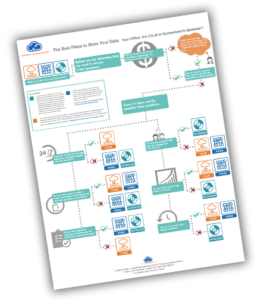As law firms embrace cloud computing to stay competitive, they often face a critical decision: Should they adopt Software as a Service (SaaS) solutions or stick with self-hosted cloud infrastructure? Both approaches have distinct advantages and trade-offs, and the right choice depends on your firm’s unique needs, resources, and goals.
In this blog, we’ll explore the key differences between SaaS and self-hosted solutions and provide guidance to help your firm make an informed decision. Be sure to check out our infographic for more help in your decision-making.
informed decision. Be sure to check out our infographic for more help in your decision-making.
1. Understanding SaaS Solutions
What is SaaS?
SaaS solutions are cloud-based applications managed entirely by a vendor. Instead of purchasing and maintaining software, you pay a subscription fee to access it. Examples include Microsoft 365, NetDocuments, and Clio.
Benefits of SaaS for Law Firms
- Ease of Use: Vendors handle updates, maintenance, and security, freeing your team to focus on legal work.
- Scalability: Easily adjust subscriptions to match your firm’s growth or contraction.
- Lower IT Overhead: SaaS eliminates the need for dedicated IT staff to manage software and servers.
- Enhanced Security: Vendors often invest in top-tier security measures, such as multi-factor authentication and data encryption.
Considerations
- Recurring Costs: While upfront costs are minimal, SaaS requires ongoing subscription fees.
- Vendor Dependency: Your data and software are hosted by a third party, which may raise concerns about accessibility and long-term viability.
- Contract Terms: SaaS providers often require long-term contracts, which could limit flexibility.
2. Understanding Self-Hosted Cloud Solutions
What is Self-Hosted?
With self-hosted solutions, your firm maintains control over software and hardware by hosting them on cloud infrastructure like Microsoft Azure or AWS. This approach mimics an on-premises setup but leverages cloud scalability and redundancy.
Benefits of Self-Hosted Solutions
- Full Control: You retain ownership of your data and infrastructure, making customization easier.
- Flexibility: Deploy any software you need, tailored to your specific workflows.
- No Vendor Lock-In: Avoid long-term contracts and maintain control over your hosting environment.
Considerations
- Higher Initial Investment: Requires IT expertise and infrastructure setup, leading to higher upfront costs.
- Ongoing Management: Firms must handle updates, security, and compliance in-house or via a managed service provider (MSP).
- Complexity: Managing cloud infrastructure can be challenging without a dedicated IT team.
3. Key Factors to Consider
When deciding between SaaS and self-hosted solutions, law firms should evaluate the following:
Cost Structure
- SaaS: Subscription-based, predictable costs but may scale with the number of users.
- Self-Hosted: Higher initial costs with ongoing expenses for IT management and cloud hosting.
Scalability
- SaaS: Ideal for rapid scaling, as additional users and features can be easily added.
- Self-Hosted: Scalable but may require significant effort and cost to expand infrastructure.
Security and Compliance
- SaaS: Vendors typically provide built-in security measures, but firms must ensure compliance with industry-specific requirements.
- Self-Hosted: Greater control over security but requires investments in endpoint protection, SOC monitoring, and multi-factor authentication.
IT Resources
- SaaS: Minimal IT involvement needed, making it suitable for smaller firms without dedicated IT staff.
- Self-Hosted: Requires skilled IT professionals or an MSP to manage infrastructure and ensure uptime.
4. Hybrid Approaches: The Best of Both Worlds
For some firms, a hybrid approach may be the answer. Combining SaaS applications with a self-hosted cloud environment allows firms to benefit from the strengths of both models. For example:
- Use SaaS for email and collaboration tools like Microsoft 365.
- Host sensitive or specialized applications in a self-managed Azure or AWS environment.
This approach provides flexibility, enabling firms to balance cost, control, and functionality.
5. Making the Right Choice
Ask Yourself:
- What are my firm’s current and future IT needs?
If simplicity and ease of use are top priorities, SaaS may be the best option. If customization and control are critical, self-hosted solutions might be better. - What is my budget for cloud computing?
SaaS offers predictable costs, while self-hosted solutions may require significant upfront investment. - What level of security does my firm require?
Both models can be secure, but self-hosted solutions require greater in-house oversight. - Do I have IT resources to manage self-hosted infrastructure?
If not, consider SaaS or partner with an MSP to manage your self-hosted cloud.
The decision between SaaS and self-hosted solutions isn’t one-size-fits-all. Each approach offers unique benefits and challenges, and your firm’s choice should reflect its operational needs, budget, and long-term goals. Whether you’re leaning toward SaaS, self-hosted, or a hybrid solution, ensure that security and compliance remain top priorities.
Need guidance on selecting the right cloud strategy for your firm? Contact an Innovative Account Executive for expert advice and tailored solutions.


